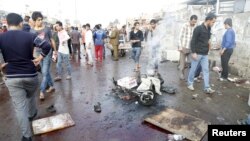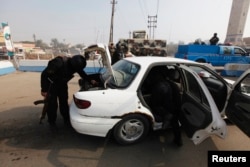Islamic State militants launched twin suicide attacks on the western and eastern outskirts of Baghdad on Sunday, killing dozens of people.
The extremists carried out a double bombing in Baghdad’s northeastern Shi’ite suburb of Sadr city, killing at least 24 people.
In a surprise assault hours earlier, three suicide bombers and gunmen riding pick up trucks stormed into Abu Ghraib, just 25 kilometers west of downtown Baghdad.
Shi’ite leader Moqtada al Sadr called upon his followers to protect Baghdad.
Residents said Baghdad’s International Zone (IZ), home to many embassies and international staff as well as Iraqi government officials, was temporarily put on high alert.
Increased numbers of Iraqi forces were also quickly deployed to Baghdad’s IZ as well as the capital’s international airport, which lies west of the city.
By early afternoon, Iraqi officials declared the fighting in Abu Ghraib was over and Baghdad residents said the city was running as normal..
Yousuf al Abadi, a spokesman for the Iraqi Interior Ministry told local media that all militants in the Abu Ghraib assault had been killed and that the situation there was “under control”.
He said some 30 Iraqi security forces had died in the fight.
But by early evening, local media reported that Iraqi fighter jets had joined the fray in Abu Ghraib, and that fighting was still going on in pockets of the city.
Abu Ghraib is west of Baghdad, roughly midway between the capital and Fallujah, which is under IS control.
The town became notorious following the 2003 invasion of Iraq after photographs showed U.S. troops abusing Iraqi detainees at Abut Ghraib prison.
In Sadr City, two bombs ripped through a crowded local mobile phone market.
The mainly Shi’ite suburb has been a focal point for sectarian violence for years, with hundreds of people killed in bomb attacks.
In August, a truck bomb at another market killed 80 people. IS militants claimed responsibility for that attack.
VOA’s Ali Javanmardi contributed to this report






